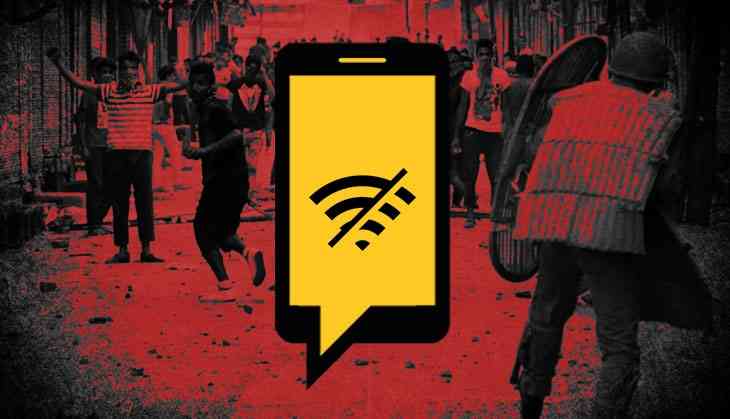"Not able to attend online classes," students, businessmen in Kashmir decry new 'unscheduled, unannounced' internet shutdowns

The unscheduled internet shutdowns in different parts of Kashmir, especially capital Srinagar, have hit the students and businesses hard.
Auqib Javeed | TwoCircles.net
SRINAGAR - For the last two weeks, Aisha Jan, 22, had to travel over 15 kilometres every day to attend her online classes in Central Kashmir’s Ganderbal district along with her younger sister.
Jaan, who lives in the Soura area of Srinagar city, was accompanied by her younger sister, Aira Jan along with their father, who drops them at a relatives home in Ganderbal so that his kids don't miss their online classes.
The area where the siblings live has been witnessing “unscheduled” internet cuts and restrictions since last month.
“I can’t attend my online classes due to internet restrictions. I don’t know why there are these restrictions,” she told TwoCircles.net.
Aisha is pursuing a Bachelor of Technology (BTech) degree in Srinagar, while her younger sister studies at 8th standard.
Mobile internet services were suspended in parts of the Kashmir valley, especially in Srinagar city, as a precautionary measure in the first week of October following a spate of civilian killings.
Eleven civilians were killed by suspected militants in Kashmir last month triggering fear, anger and panic in the Valley.
In the Srinagar district, the areas where the people complain about the frequent internet and call drops include Maharajgunj, Nowhatta, Safa Kadal, Bohri Kadal, Anchar, Eidgah, Qamarwari, Soura and Buchpora.
Reports coming from South Kashmir’ Kulgam, Pulwama and Pampore suggest the residents are witnessing frequent internet shutdowns.
The residents complain that “unannounced and unscheduled” internet cuts have hit their education and business alike.
The locals told TwoCircles.net that the mobile internet goes off frequently at any time during the day. The residents alleged that they are experiencing frequent call drops causing inconvenience to students and traders.
The authorities on their part maintain that the decision was taken after security agencies thought the evening hours were being used by militants to target civilians.
“The killings in Srinagar occurred during evening hours. It was also found that some apps were used in these areas by the militants,” Divisional Commissioner Kashmir, Pandurang K. Pole was quoted by a local newspaper in Kashmir.
He further said, “So as a precautionary measure we restricted the internet during non-online class hours i.e. from 3 PM onwards.”
The Jammu and Kashmir Police said that the internet was shut down because of “terrorism-related incidents” in the Union territory, the police said in a tweet.
However, the locals alleged that the internet restrictions are “unscheduled.”
“My two daughters had to attend an online class at 11 AM every day but as soon as I tried to open the zoom app, I failed to connect it due to no internet,” Nisar Ahmad, a resident of Safa Kadal, Srinagar said.
Nisar said not only the internet but "the phone calls have also been dropping suddenly from last month."
“The government needs to come clean on this. The education of our kids suffer because of frequent internet restrictions,” Ahmad added.
The authorities have frequently restricted the internet and phone connections in Kashmir under the pretext of maintaining “law and order."
Business and education have taken the biggest hit due to the internet shutdowns from the last three years, especially when the special status of the erstwhile state of Jammu and Kashmir was revoked by the BJO government on 5 August 2019.
According to a report, India reported the highest number of internet shutdowns last year, at 109 out of a total of 155 globally. This is the third consecutive year India has topped the global charts on this score, a new report by digital rights and privacy organisation Access Now has found.
“It is alarming that the world's largest democracy - India - continues to be the biggest instigator of internet shutdowns in the world,” Raman Jit Singh Chima, Senior International Counsel and Asia Pacific Policy Director at Access Now said.
“We have lived through targeted blackouts in Jammu and Kashmir for years, and watched shutdowns spread to every part of the country, and increasingly being used to target peaceful protestors and hide the actions of government authorities. People in India live in precarity. This is not on par with international human rights standards, nor is it in line with the progressive facade of the Union Government’s Digital India mission.”
Sami Ullah, the co-founder of Fast Beetle delivery service in Kashmir, told TwoCircles.net that the company’s operation had come to a halt due to the “incessant seizing of bikes” by the police in Srinagar. “Just when the businesses in Kashmir were trying to recover from the losses caused during article 370 and global pandemic, our law and order is crumbling again and again,” he said in a tweet.
Many youths in Kashmir who had started their business online maintain that they are thinking of winding up the business due to internet restrictions.
“I am thinking of winding up my business. The problem is the internet restrictions will be there until the Kashmir issue gets resolved. So, I am thinking of doing something else,” Mohammad Jibran, who had his travel company in the downtown area of Srinagar.
Auqib Javeed is a journalist based in Srinagar, Kashmir. He tweets at @AuqibJaveed
